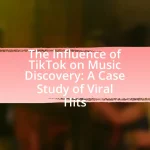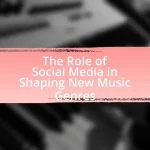The article examines the significant role of artificial intelligence (AI) in music production, highlighting its impact on creativity and authenticity. It discusses how AI automates tasks such as composition, mixing, and mastering, thereby streamlining the production process and enhancing artistic collaboration. Key advancements in AI tools, including algorithmic composition and real-time audio processing, are explored, along with the implications for traditional music production methods. The article also addresses the ethical considerations surrounding AI-generated music, including issues of originality, copyright, and the responsibilities of creators when integrating AI into their work. Overall, it provides a comprehensive overview of how AI is reshaping the music industry and influencing the creative landscape.
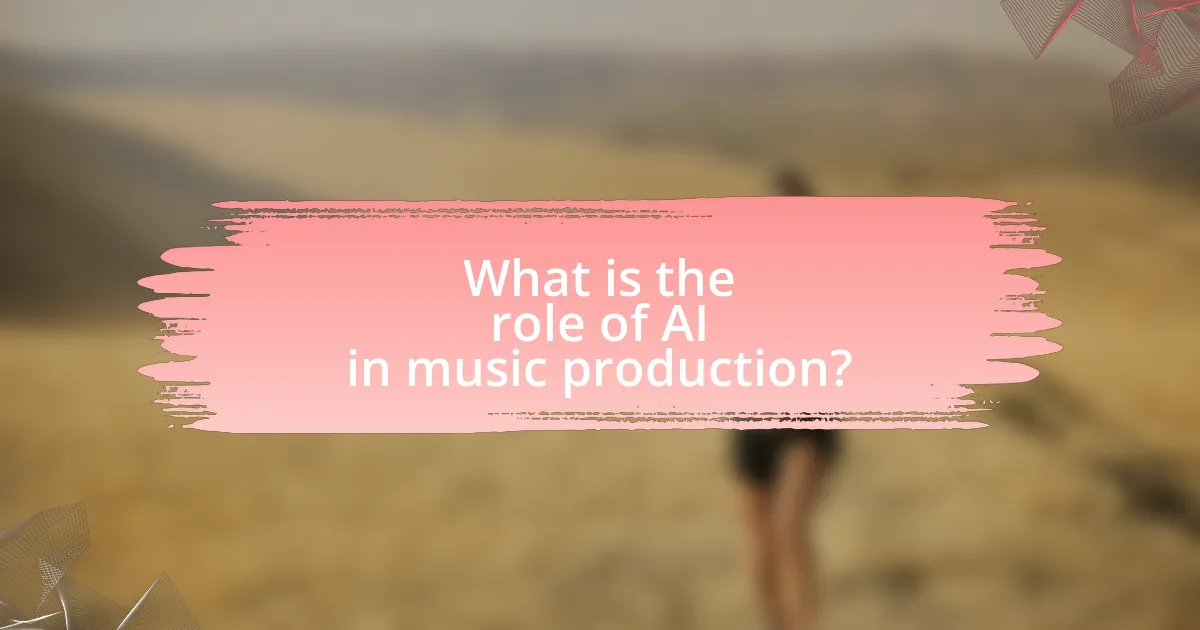
What is the role of AI in music production?
AI plays a significant role in music production by automating tasks, enhancing creativity, and providing analytical insights. It assists in composing music, generating sounds, and mixing tracks, which streamlines the production process. For instance, AI algorithms can analyze vast datasets of music to identify trends and suggest chord progressions or melodies, thereby aiding musicians in their creative endeavors. Additionally, tools like OpenAI’s MuseNet and Google’s Magenta demonstrate how AI can generate original compositions, showcasing its potential to innovate within the music industry.
How has AI technology evolved in the music industry?
AI technology has evolved significantly in the music industry by enhancing music creation, production, and distribution processes. Initially, AI was used for simple tasks like music recommendation systems, but advancements have led to sophisticated algorithms capable of composing original music, analyzing trends, and even mastering tracks. For instance, platforms like AIVA and Amper Music utilize AI to generate compositions that mimic various genres and styles, demonstrating the technology’s ability to assist artists in the creative process. Additionally, AI-driven analytics tools, such as those from Spotify, provide insights into listener preferences, enabling targeted marketing strategies. This evolution reflects a broader trend where AI not only supports but also collaborates with musicians, reshaping the landscape of music production and consumption.
What are the key advancements in AI tools for music production?
Key advancements in AI tools for music production include algorithmic composition, real-time audio processing, and enhanced collaboration features. Algorithmic composition tools, such as OpenAI’s MuseNet, utilize deep learning to generate original music across various genres, allowing producers to explore new creative avenues. Real-time audio processing advancements, exemplified by tools like LANDR, enable automated mastering and mixing, significantly reducing production time while maintaining high-quality sound. Additionally, AI-driven collaboration platforms, such as AIVA, facilitate seamless teamwork among musicians by providing intelligent suggestions and automating repetitive tasks, thereby enhancing the overall creative process. These advancements demonstrate the transformative impact of AI on music production, making it more accessible and innovative.
How do these advancements change traditional music production methods?
Advancements in AI technology significantly alter traditional music production methods by automating tasks such as mixing, mastering, and even composition. These changes enable producers to focus more on creative aspects rather than technical details, streamlining the production process. For instance, AI algorithms can analyze vast amounts of music data to suggest chord progressions or melodies, which can enhance creativity and efficiency. Additionally, AI-driven tools like LANDR for mastering provide instant feedback and adjustments, reducing the time and expertise required for high-quality production. This shift not only democratizes music production, allowing more individuals to create music, but also raises questions about authenticity and the role of human creativity in the artistic process.
What are the different applications of AI in music production?
AI is applied in music production through various methods, including composition, mixing, mastering, and sound design. In composition, AI algorithms can generate melodies and harmonies, as seen in tools like OpenAI’s MuseNet, which can create original music across different genres. For mixing, AI-driven software like LANDR automates the process, analyzing tracks to optimize sound quality. In mastering, AI tools such as iZotope Ozone utilize machine learning to enhance audio tracks, ensuring they meet industry standards. Additionally, AI assists in sound design by creating unique sounds and samples, enabling producers to explore new sonic possibilities. These applications demonstrate AI’s significant role in enhancing creativity and efficiency in music production.
How does AI assist in composition and songwriting?
AI assists in composition and songwriting by providing tools that generate melodies, harmonies, and lyrics based on user inputs and preferences. These AI systems analyze vast datasets of existing music to identify patterns and styles, enabling them to create original compositions that align with specific genres or emotional tones. For instance, platforms like OpenAI’s MuseNet and Google’s Magenta utilize deep learning algorithms to compose music that mimics the styles of renowned artists, demonstrating the capability of AI to enhance creativity in songwriting.
What role does AI play in sound design and mixing?
AI plays a significant role in sound design and mixing by automating processes, enhancing creativity, and providing advanced analytical tools. In sound design, AI algorithms can generate unique sounds and textures, allowing artists to explore new sonic possibilities that may not be achievable through traditional methods. For mixing, AI-driven software can analyze audio tracks, suggest optimal levels, and apply effects based on learned preferences from professional mixes, thereby streamlining the workflow. Research from the Journal of New Music Research indicates that AI tools can reduce mixing time by up to 30%, demonstrating their efficiency and effectiveness in the production process.
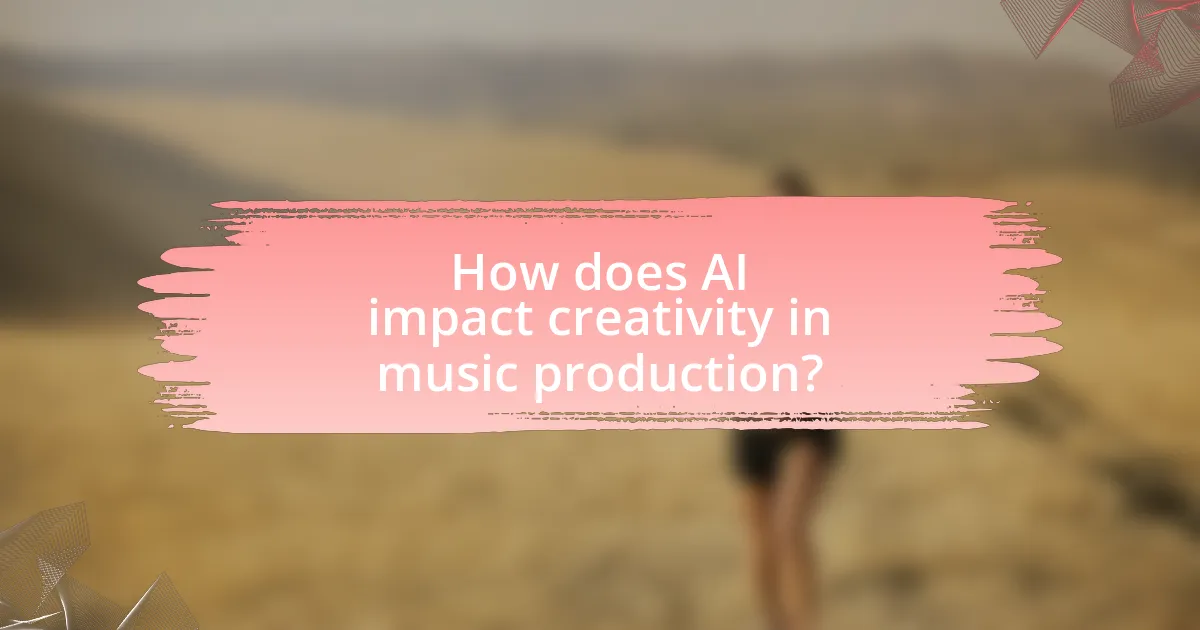
How does AI impact creativity in music production?
AI enhances creativity in music production by providing tools that assist artists in generating new sounds, compositions, and arrangements. For instance, AI algorithms can analyze vast amounts of music data to identify patterns and suggest innovative chord progressions or melodies, which can inspire musicians to explore new creative directions. Research by the MIT Media Lab demonstrates that AI systems like AIVA and OpenAI’s MuseNet can compose original pieces that mimic various styles, showcasing AI’s ability to augment human creativity rather than replace it. This collaborative approach allows artists to push the boundaries of their creativity while maintaining their unique artistic voice.
Can AI enhance or limit artistic expression in music?
AI can both enhance and limit artistic expression in music. On one hand, AI tools can facilitate creativity by providing musicians with new sounds, generating compositions, and offering innovative production techniques, as evidenced by platforms like AIVA and Amper Music, which allow users to create music collaboratively with AI. On the other hand, reliance on AI may restrict individual artistic expression by promoting formulaic compositions and reducing the uniqueness of human creativity, as seen in the growing concern that algorithm-driven music may lead to homogenization in the industry. Thus, while AI has the potential to expand creative possibilities, it also poses risks to the authenticity and individuality of musical expression.
What are the arguments for AI as a creative collaborator?
AI serves as a creative collaborator by enhancing human creativity, providing new tools for artistic expression, and generating innovative ideas. AI algorithms can analyze vast amounts of data, identifying patterns and trends that inspire musicians and artists. For instance, AI systems like OpenAI’s MuseNet can compose original music across various genres, demonstrating the ability to create complex compositions that might not have been conceived by humans alone. Additionally, AI can assist in the creative process by offering suggestions, automating repetitive tasks, and enabling artists to experiment with new styles, ultimately expanding the boundaries of creativity. This collaborative dynamic has been shown to lead to unique artistic outcomes, as evidenced by projects where human artists and AI systems co-create music, resulting in works that blend human emotion with computational precision.
How do musicians perceive AI’s influence on their creative process?
Musicians perceive AI’s influence on their creative process as both a tool for enhancement and a potential threat to authenticity. Many artists appreciate AI for its ability to generate new ideas, streamline production, and assist in tasks such as mixing and mastering, which can lead to increased efficiency and innovation in their work. For instance, a survey conducted by the Music Industry Research Association found that 65% of musicians believe AI can help them explore new musical styles and concepts. However, some musicians express concern that reliance on AI may dilute the human element of creativity, fearing that it could lead to homogenized music lacking emotional depth. This dual perception highlights the ongoing debate within the music community regarding the balance between leveraging technology and maintaining artistic integrity.
What are the potential risks of relying on AI in music creation?
Relying on AI in music creation poses several potential risks, including the loss of human creativity, over-reliance on algorithms, and issues of copyright infringement. The loss of human creativity occurs as AI-generated music may lack the emotional depth and personal touch that human composers provide, leading to homogenized soundscapes. Over-reliance on algorithms can stifle innovation, as artists may depend on AI tools for composition rather than exploring their own creative instincts. Additionally, copyright infringement risks arise when AI systems are trained on existing music without proper licensing, potentially leading to legal disputes over ownership and originality. These risks highlight the need for a balanced approach that integrates AI while preserving the unique contributions of human musicians.
How might AI-generated music affect human composers?
AI-generated music may lead to both collaboration and competition for human composers. As AI tools become more sophisticated, they can assist composers in generating ideas, enhancing creativity, and streamlining the composition process. For instance, AI can analyze vast amounts of music data to suggest chord progressions or melodies, which can inspire human composers. However, the proliferation of AI-generated music also poses a threat to traditional composers by saturating the market with easily produced tracks, potentially diminishing the perceived value of human-created music. Research indicates that as AI music generation tools improve, they could disrupt the music industry by changing how music is created and consumed, leading to a reevaluation of the role of human composers in the creative process.
What concerns exist regarding originality and plagiarism in AI music?
Concerns regarding originality and plagiarism in AI music primarily revolve around the potential for AI-generated compositions to replicate existing works without proper attribution. The use of algorithms trained on vast datasets of pre-existing music raises questions about whether the output can be considered original or merely a derivative of the input material. For instance, a study by the University of California, Berkeley, highlights that AI systems can inadvertently produce music that closely resembles copyrighted songs, leading to legal disputes over intellectual property rights. This situation creates a dilemma for artists and producers, as the line between inspiration and infringement becomes increasingly blurred in the realm of AI-generated music.
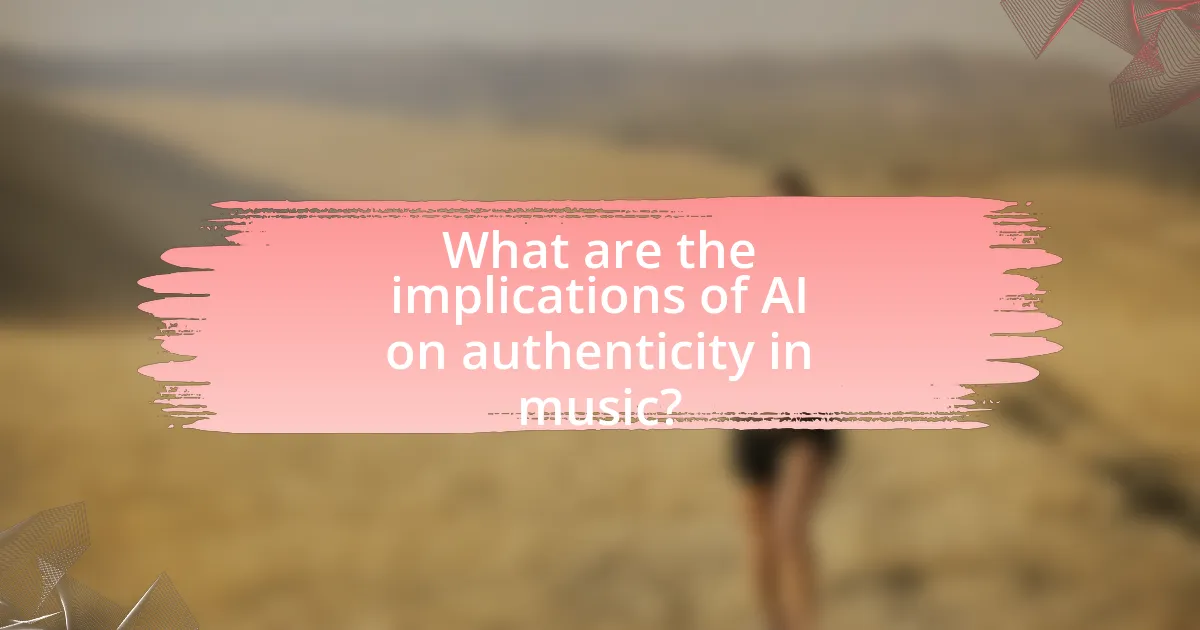
What are the implications of AI on authenticity in music?
AI significantly impacts authenticity in music by enabling the creation of music that can mimic human styles and emotions, potentially blurring the lines between genuine artistry and algorithm-generated content. This technology allows for the replication of unique sounds and styles, which raises questions about the originality and emotional depth of AI-generated music compared to human-created works. For instance, a study by the University of Cambridge found that listeners often struggle to distinguish between music composed by humans and that produced by AI, indicating that AI can produce works that are perceived as authentic. This challenges traditional notions of authenticity, as the emotional connection and personal experiences typically associated with music creation may be absent in AI-generated compositions.
How does AI challenge the concept of authenticity in music production?
AI challenges the concept of authenticity in music production by enabling the creation of music that can mimic human styles and emotions, often blurring the lines between original and generated content. This technological advancement raises questions about the true source of creativity, as AI can produce compositions that sound indistinguishable from those created by human artists. For instance, AI systems like OpenAI’s MuseNet and Google’s Magenta have demonstrated the ability to generate complex musical pieces across various genres, leading to debates about whether these AI-generated works can be considered authentic expressions of artistry. The ability of AI to analyze vast datasets of existing music and replicate patterns further complicates the notion of originality, as it challenges the traditional understanding of artistic intent and emotional connection in music.
What defines authenticity in the context of music?
Authenticity in the context of music is defined by the genuine expression of an artist’s identity, emotions, and cultural background. This authenticity is often measured by the artist’s ability to convey personal experiences and connect with listeners on a deeper level, which can be evidenced by the emotional resonance of their work and the cultural narratives they represent. For instance, artists like Bob Dylan and Nina Simone are celebrated for their authentic storytelling that reflects their personal and societal struggles, which has contributed to their lasting impact in music history.
How do listeners respond to AI-generated music versus human-created music?
Listeners generally exhibit a mixed response to AI-generated music compared to human-created music. Research indicates that while some listeners appreciate the novelty and technical proficiency of AI-generated compositions, others express a preference for the emotional depth and authenticity typically found in human-created music. A study published in the journal “Computers in Human Behavior” by researchers at the University of Cambridge found that participants rated human-created music higher in emotional engagement and personal connection, while AI-generated music was often perceived as innovative but lacking in emotional resonance. This suggests that while AI music can attract interest for its creativity, it may not fully replicate the emotional impact of music crafted by human artists.
What ethical considerations arise from AI in music production?
Ethical considerations arising from AI in music production include issues of authorship, copyright infringement, and the potential for bias in generated content. The use of AI tools can blur the lines of who is considered the creator of a musical work, leading to disputes over intellectual property rights. For instance, if an AI generates a song based on existing works, it may inadvertently replicate elements of those works, raising concerns about copyright violations. Additionally, AI systems can reflect biases present in their training data, which may result in the perpetuation of stereotypes or exclusion of diverse musical styles. These ethical dilemmas necessitate careful consideration of the implications of AI technology in the creative process.
How do copyright laws apply to AI-generated music?
Copyright laws apply to AI-generated music by determining the ownership and rights associated with the music created by artificial intelligence. In many jurisdictions, copyright protection requires a human author; therefore, music generated solely by AI may not qualify for copyright unless a human contributes significantly to its creation. For instance, the U.S. Copyright Office has stated that works created by AI without human intervention do not receive copyright protection, as seen in the case of the “Stephen Thaler” decision regarding the DABUS AI system. This indicates that while AI can assist in music production, the legal framework currently favors human creators in establishing copyright ownership.
What responsibilities do creators have when using AI tools?
Creators have the responsibility to ensure ethical use of AI tools in music production. This includes respecting copyright laws, as AI-generated content can inadvertently infringe on existing works. Additionally, creators must maintain transparency about the use of AI in their projects, informing audiences when AI tools have significantly influenced the creative process. Furthermore, creators should strive to preserve authenticity by blending AI-generated elements with their unique artistic voice, ensuring that the final product reflects their individual creativity rather than solely relying on AI outputs. These responsibilities are crucial to fostering trust and integrity within the music industry as AI continues to evolve.
What best practices should musicians follow when integrating AI into their work?
Musicians should prioritize collaboration with AI tools to enhance creativity while maintaining their unique artistic voice. By using AI for tasks such as generating ideas, composing, or mixing, musicians can streamline their workflow and explore new sonic possibilities. For instance, a study by the University of California, Berkeley, found that musicians who integrated AI into their creative processes reported increased inspiration and efficiency. Additionally, musicians should remain transparent about their use of AI in their work, as this fosters authenticity and builds trust with their audience. This approach aligns with the growing trend of ethical AI use in creative industries, ensuring that artists retain ownership of their creative output while benefiting from technological advancements.

